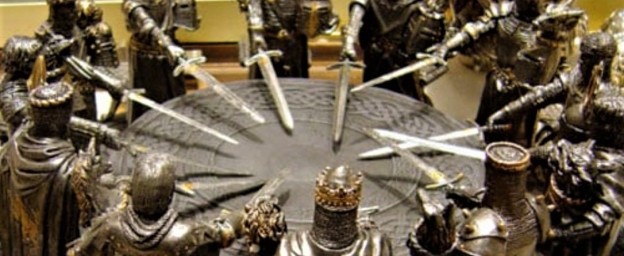As a boy and young man, I was fascinated by tales of derring-do and feats of glory by heroes, both real and fictional. Among the earliest of these were the stories of King Arthur and his Knights of the Round Table; to this day, I can name my favourites without a fact-check—Sir Kay, Sir Gawain, Sir Bedivere, Sir Tristan, Sir Lancelot, Sir Galahad.

Arthur and his knights, according to Le Morte d’Arthur by Sir Thomas Malory—one of many writers who wrote of their exploits—swore to uphold a code of chivalry, which included:
– never to assault or murder,
– never to commit treason, and
– to provide succor to those in need.
I was too young, of course, to understand the clashes that arose between Arthur and Sir Lancelot, and later between Arthur and his son, Sir Mordred, which stemmed from their illicit love for the faithless Queen Guinevere. Those led ultimately to the death of Arthur and the end of his glorious reign, and I mourned their failed quest.
A lasting effect of this Arthurian fascination was a propensity as I grew older to favour the underdog in any conflict, to root for those attempting seemingly-impossible pursuits—the Don Quixotes of the world, engaged in Sisyphean tasks to which they would not surrender. I was an incurable romantic.
So it was unsurprising, I suppose, that a major focus for me in university would be Russian and American history—to wit, the demise of the Romanov dynasty in 1917, and especially the U.S. Civil War from 1861-1865. In both cases, I found myself on the side of the lost causes—the Czarist regime and the Confederacy—despite knowing the outcome for both. And like my younger self, who didn’t understand the Arthurian contradictions until much later, it took a long time for me to realize the root causes and lasting implications of those cataclysmic events.
The Civil War, in particular, captivated me. I read as many as I could of the chroniclers of the period—Bruce Catton, Allan Nevins, Doris Kearns Goodwin, Shelby Foote, Douglas Southall Freeman, Henry Steele Commager. I favoured the gallant Confederate commanders—Lee, Jackson, Stuart—seeing them as descendants of the Arthurian knights of old. I was taken by their tales of heroism, their masterful military maneuverings, and dismayed as the tide turned inexorably against them.

Even still, the names of the battlefields (hallowed grounds for both sides) strike a chord—Manassas, Shiloh, Antietam, Chancellorsville, and of course, Gettysburg.
As I sit here now, however, I have long since come to view things differently. The young man I was had absolutely no concept of the evils of slavery, the forced subjugation of an entire race of people; the unfettered privilege of landed, white, male gentry, determined to maintain their autocratic position; the venality of elected politicians (again, all male and white) who put their personal interests and the fate of their political party ahead of their vision of a nation of freedom for all.
That young man, the beneficiary of white privilege, had no idea what being white and privileged meant, either for him, or for those to whom it was denied.
But as I said, I have come to view things differently. And following the killing of yet another unarmed black person in the poor Benighted States of America, it is impossible not to cry, “Enough!”
In a post on this blog a few years ago, On Being White, I wrote:
White privilege explains power structures inherent in our society that benefit white people disproportionately, while putting people of colour at a disadvantage.
White nationalists believe white identity should be the organizing principle of Western civilization.
White supremacists believe the white race is inherently superior to other races, and that white people should have control over people of other races.
In another post, Of the People, I wrote (quoting Joseph de Maistre, a nineteenth-century writer and diplomat):
[Such] false opinions are like false money, struck first of all by guilty men and thereafter circulated by honest people who perpetuate the crime without knowing what they are doing.
And to that I added:
Many of us, alas, have no idea of the origin or veracity of the so-called truths we champion. We simply echo them, as if truth can be created through the repetition of a lie…

I realize now that, because that young man I was did not understand the roots from which sprouted those underdog causes he once supported, he accepted at face-value their false opinions. It was only as I began over time to see them through the eyes of those who were suppressed that I realized their falsity.
Although I decry violence and vandalism, I endorse the legitimate protests of a people who (to excerpt a song from Les Misérables) declare they will not be slaves again. It has almost always been so, that the downtrodden and oppressed will eventually rise up and seize what they have not been granted, their freedom.
In one of those previous posts, I also wrote:
…[sometimes] we decide not to act, thereby abrogating our democratic opportunity to choose the [society] we prefer. And when we do that, we leave the right to choose in the hands of others—others whose opinions and beliefs we may not agree with.
When those others are entrenched in their high positions, they are never eager to surrender their privilege. But a righteous cause cannot forever be stifled, and many of the American people are deciding in front of our eyes, not to refrain from acting, but to take action to bring about change, despite the decades-long reluctance of those in power to do so.
It will be interesting, indeed, to see what emerges from this latest round of justifiable insurrection against the white bastion of entrenched power and privilege.
History is watching.
